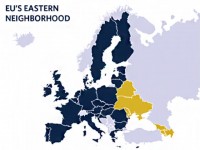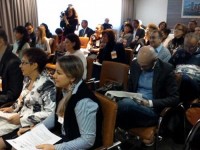Minsk’s muddled media clampdown could jeopardize warming of relations with the West.
Andrei Yahorau: It is the state which is mostly dependent on grants in Belarus

Our government always claims that Belarusan opposition and civil society depend on grants, whereas the state itself is embezzling funds to an even greater extent.
This opinion in the talk with the EuroBelarus Information Service shared Andrei Yahorau, political scientist, the head of the Centre for European Transformation and the co-author of the working document “Civil society’s role and place in the system of the EU’s donor assistance for Belarus”, which was recently submitted to popular verdict.
As Yahorau has already noted, the speculation about the issues of international donor assistance can be stopped only by the highest possible for Belarus level of transparency. However, it is not clear exactly to whom and for what purpose the results of the research were directed.
— It seems that your research did not arouse a proper interest in civil society in Belarus. Is that true?
— I would say that it was quite interesting for the independent media, as seen by the number of reprints and comments from readers. Thus, the material turned out to be resonant.
— Has your research attracted the attention of the international bodies, which are involved in EU donor assistance for Belarus?
— Yes, it has. The European Commission has also expressed some interest in this research.
— According to your calculations, from 2006 to 2011 Belarus has received about $700 million of donor assistance. Only about 10 per cent of all the money was allocated directly to civil society. For some people $70 million is a huge sum of money, for others it is nothing. At the same time the state and the near-state structures received far greater international assistance. Why is that?
— Generally, we can speak about such ratio of the international assistance, although it requires further research. With the available statistics it is difficult to calculate the exact amounts which, roughly speaking, crossed the border and ended up in Belarus for both the state and the civil society. Therefore, we can only implicitly estimate the amount of money on the basis of the sectors which received this aid. And when we speak about the 10 per cent which has been allocated exactly to civil society we are referring to the money that was spent for the development of civil society and that for sure could not be spent on the government support. That is, this figure is rather vague.
— So who does the international community help in this case — the civil society or the Belarusan regime?
— I would say that the international community primarily allocates its help to Belarus. And since Belarus is diverse, the aid takes different directions, which is a common international practice. The aid comes for sustainable development, poverty reduction, formation of democratic institutions, for stimulation of the civil society participation and so on. Accordingly, the developed countries of the world provide assistance in the development to less developed countries which include Belarus. We are talking about the all-round development — in economic, social, political and technological spheres. The international assistance incorporates this whole set of issues. And the help to civil society is only one part of international aid.
On the other hand, it is important to supervise who uses this aid. It is obvious that regulation of some issues can not go through civil society. In such cases the international community has to cooperate with non-democratic regimes, not only in Belarus but also around the world. For example, it concerns the matters of guarding the boundaries or fighting against international crime. Thus, the relations in the field of international assistance are such that the international institutions are forced to work with all sorts of regimes. In general, we can, of course, criticize such approaches in the international community, but it is a different issue.
— You mean that the methods of the international community should not cause any surprise or disturbance?
— This is not entirely true. The meaning of what we aspire to in our research is to show more or less objective picture of how this assistance is provided. We want to make these issues more open to reduce the speculation which comes from the both sides. For example, the government continues to claim that the Belarusan opposition and civil society are supported by foreign money; it calls many structures “dependents on grants”. But the Belarusan government is even a bigger “dependent”. Similarly, representatives of the Belarusan civil society and the Belarusan opposition often theoretically claim that the state is provided with too much aid while, in their opinion, the major part of the international assistance should be spent on the democratization of the country. But neither first, nor second point is right to the full. So we need to take a realistic view of the situation. And it turns out that not only civil society is to a large extent dependent on international donor assistance, but also the Belarusan government uses a huge amount of the assistance.
— Another key conclusion of your research appears to be your statement that Belarus receives at best only about one third of all donor support. If we sum it up with other points of the research, it turns out that the so-called “dependents” are not the Belarusan government and not even the structures that support the current regime, but the Europeans themselves. Is it really so?
— This statement is too categorical and I am not ready to accept it on the basis of the data we have right now. We cannot definitely say that, although it is obvious that a part of the donor assistance is spent inside the countries which also provide the assistance trying to maintain their own civil society and to create more jobs. For example, in educational sphere it is clear that the money is spent to pay for education or to pay scholarships to Belarusan students. Who is the beneficiary of this help? The direct beneficiary remains a Belarusan student even though the money is spent inside the EU. What is interesting here is that these funds are the money of European taxpayers. But for some reason many Belarusans are constantly trying to divide the money. And it looks quite strange. We should understand that the money is allocated on certain aims, but it is not Belarusan money. After all, this is the money of European taxpayers who are interested in progress in the spheres of education, economics, civil society and others. Considering all this, the dissatisfaction from Belarusans looks strange. We have to count the money our citizens pay through taxes. But the fact for what the Belarusan budget money is spent does not cause such a disturbance as for what the donor assistance money is spent. It is surprising: we count the international money very thoroughly, but we do not even discuss how our taxes are spent inside the country. It seems that Belarusans consider themselves exclusively as subjects, that is, people who live under tribute — they pay the tribute but do not understand that it is their money. However, many people take European money for granted.
— Can Belarusan civil society survive and develop without international donor assistance?
— Not now. This is obvious because the situation is such that the civil society organizations in Belarus cannot get money from internal sources. We have significantly cut charity and sponsorship and there is no free money that can be allocated to civil society, let’s say, by Belarusan business. In our country it is impossible to allocate money for such purposes without a threat to a business. Thus, there is no money inside the country, it is cut. This is the result of a deliberate policy of the regime to control and to monitor the financial flows to the country and to eliminate free private money that can be invested into politics or into development of civil society. Therefore, Belarusan civil society today is forced to exist in these conditions. And it is terrible.
— Can the representatives of civil society in Belarus somehow influence the situation?
— Of course they can. But to do so, civil society should be consolidated. The voice of civil society must be clearly audible and strictly reasoned. It is necessary to lobby for their interests; only then their voice will be heard. The National Platform of the Civil Society Forum is able to work in this direction, gaining power and influence.
— Recent calls for the audit of the financial assistance to the political opposition disappeared very quickly from the public information space. Your research does not have any claims to a wide resonance either. Does it mean that the current system is not capable of transformation and that many people feel comfortable in today’s Belarus?
— In many ways it is true. Many people are interested in maintaining the existing system. People are not interested in changing it because they exist due to this very establishment and they do not want to break it. But in our research we show the situation as it is in reality. And we do that on the basis of the available data. But if you examine more deeply there are a lot of disadvantages in the system of international aid. There are many examples, incidents and questions to consider.
— What is the main conclusion of the work you have done?
— From our point of view, the main conclusion about the role and place of civil society in the international aid system is that today the role and place of civil society in this matter is very small, which is not good. The role of civil society in this regard should be greater. And I basically mean not only the amount of money allocated for the development of civil society, but also the increasing role of civil society in determining the purposes on which the international assistance is spent. Then, in our opinion, the money will be spent more efficiently than it is spent now.
Others
-
In Belarus, a rising fear: Will we be the next Ukraine?
The relationship between Russia and Belarus has never been an easy one. The two former Soviet republics have spent the last two decades on a roller coaster ride — sometimes allies, sometimes adversaries in heated public rows.
-
The EU’s Benign Neglect of Eastern Europe
Between November 6 and December 11, 2015, Carnegie Europe continued its Capitals Series. In this second phase, the focus was on the EU’s Eastern neighbors, which the bloc has so often zigzagged over in trying to establish a coherent policy toward them collectively or bilaterally.
-
New ENP and Civil Society’s Role in Focus of the 7th EaP CSF Annual Assembly (Photo)
The 7th Annual Assembly of the Eastern Partnership Civil Society Forum was held in Kyiv on 19-21 November attracting around 300 participants, observers and guests who attended more than 20 sessions and a Networking Fair in the framework of the Assembly.
-
Is social economy a phenomenon for Belarus?
The conference “Social economy: how to be successful despite the crisis” launched in Minsk on October 22.








Comments
Andrei Yahorau — Al Jazeera: “Lukashenko is irresponsible”
He said Belarus would likely face economic tightening not only as a result of the coronavirus pandemic but also a Russian trade oil crisis that worsened this past winter.